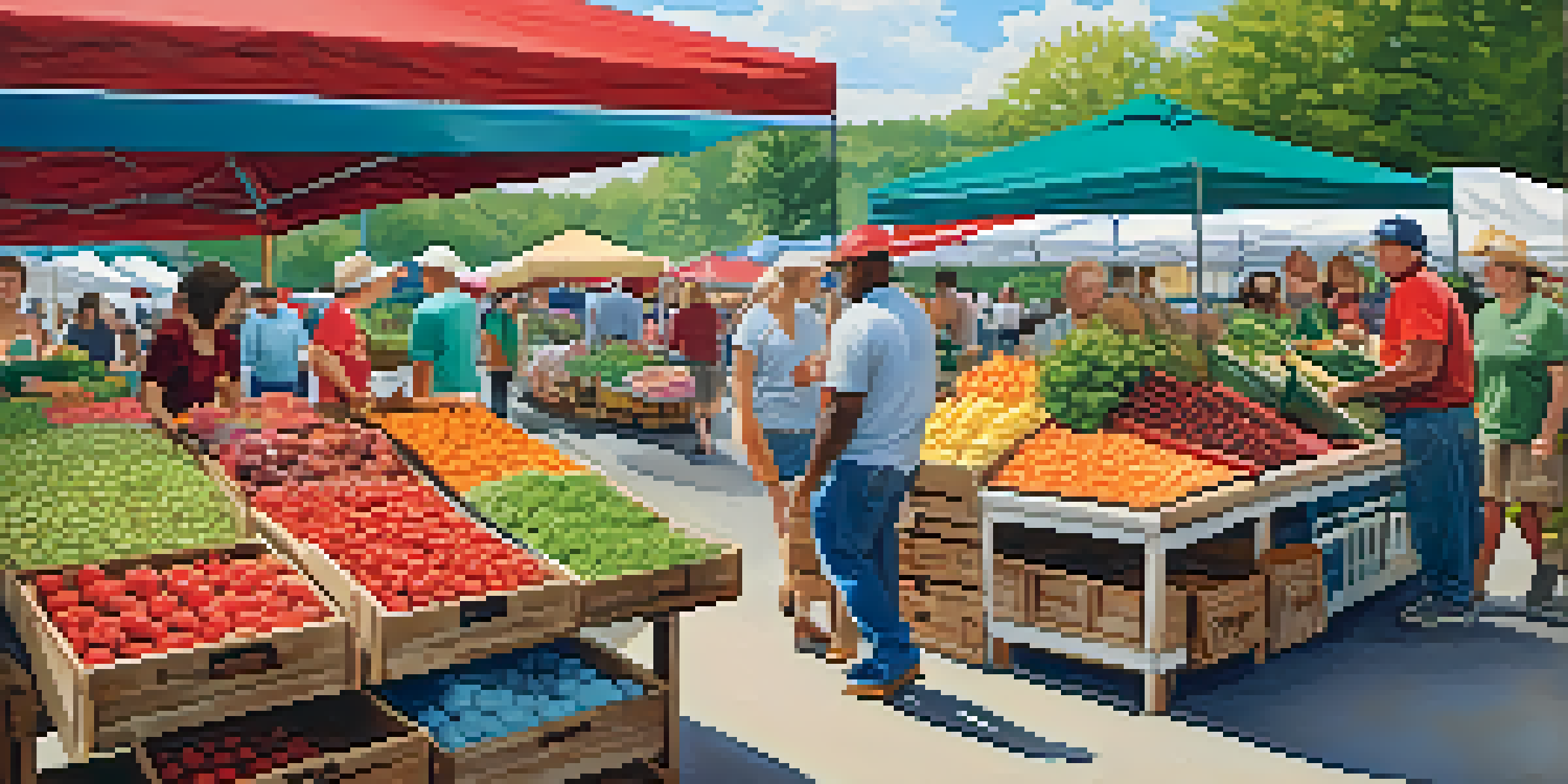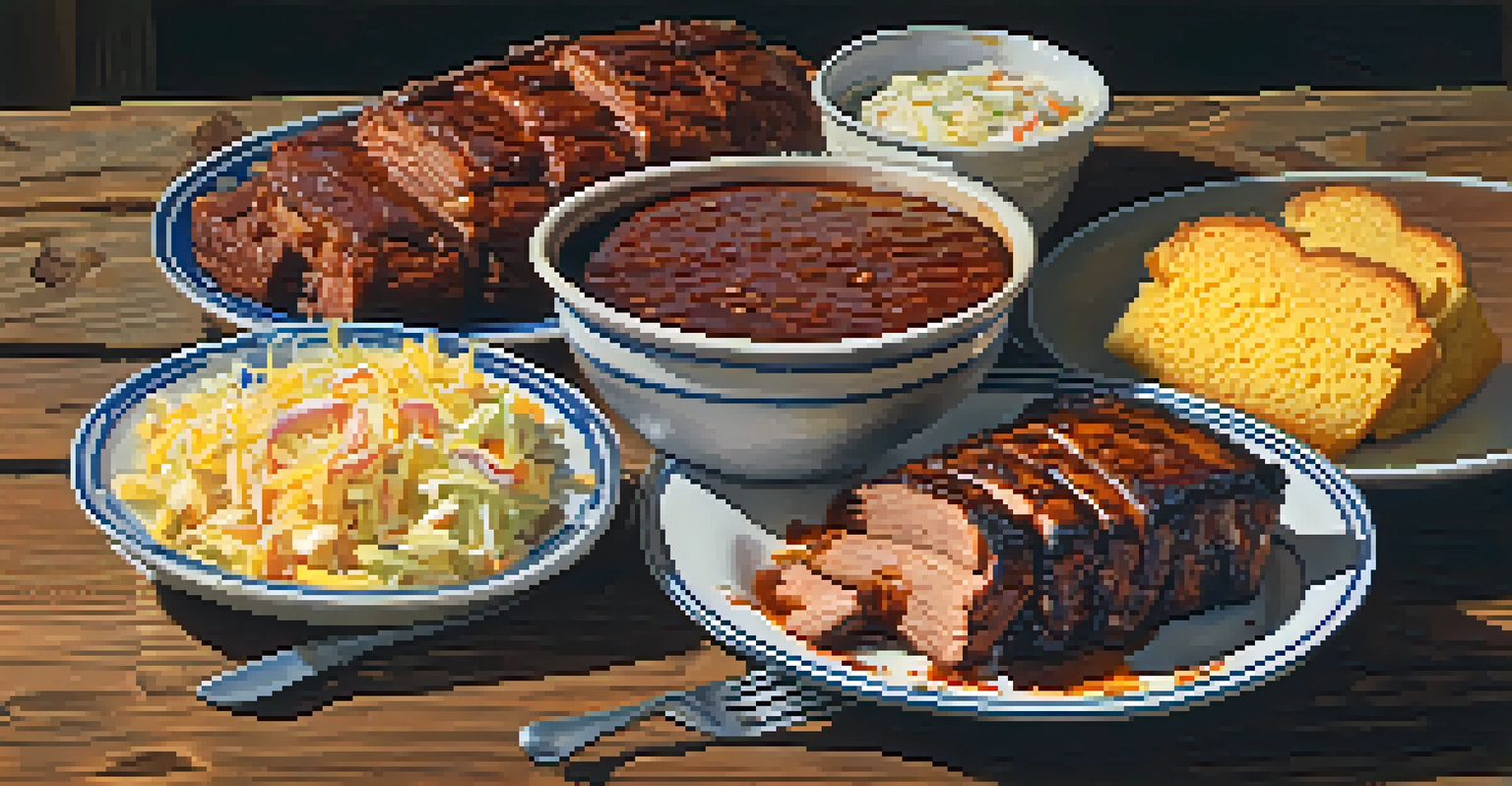Cuisine of North Carolina: A Culinary Heritage Exploration

An Introduction to North Carolina's Culinary Landscape
North Carolina's culinary heritage is a delightful blend of flavors and traditions, rooted in both Indigenous and settler influences. From the mountains to the coast, every region boasts unique dishes that reflect the local resources and cultural history. This rich tapestry of food is not just about sustenance; it's a celebration of community and identity.
Food is our common ground, a universal experience.
The state's cuisine is a reflection of its geography. The Appalachian Mountains offer hearty, rustic fare, while the coastal regions showcase fresh seafood. This diversity not only highlights the ingredients available but also tells the story of the people who have inhabited these areas for generations.
As we explore the various elements of North Carolina's food culture, we'll uncover how each dish carries a piece of history and tradition. Prepare to dive into a culinary journey that showcases the heart and soul of this vibrant state.
Barbecue: The Heart and Soul of North Carolina
When it comes to North Carolina cuisine, barbecue reigns supreme. This culinary staple is not just a meal; it's a cultural event that brings people together. The debate between Eastern and Western styles of barbecue—vinegar-based versus tomato-based sauces—fuels friendly rivalries and passionate discussions among locals.

Eastern-style barbecue is characterized by its tangy vinegar sauce, which perfectly complements the slow-cooked whole hog. In contrast, Western-style focuses on pork shoulder with a sweeter tomato-based sauce, showcasing the region's unique flavor preferences. Both styles have their loyal fans, making barbecue a must-try for anyone visiting the state.
Diverse Culinary Traditions
North Carolina's cuisine showcases a rich tapestry of flavors influenced by its geography, blending Indigenous and settler traditions across various regions.
Festivals dedicated to barbecue are common across North Carolina, celebrating this beloved dish. These events not only highlight the food but also the stories and traditions surrounding it, reinforcing barbecue's role as a cultural cornerstone in the state.
Seafood: A Coastal Treasure Trove
The coastal regions of North Carolina are a treasure trove of fresh seafood, with dishes that reflect the state's maritime heritage. From succulent shrimp and oysters to flaky fish, the bounty of the Atlantic Ocean plays a significant role in local cuisine. The proximity to the water means that seafood is often served fresh, making it a key component of many dishes.
Cooking is like love. It should be entered into with abandon or not at all.
One iconic dish is the Calabash-style seafood, which involves lightly breading and frying a variety of seafood, resulting in a crispy, golden exterior. This style of cooking originated in a small fishing village and has since become a popular culinary trend throughout the state. It's a perfect example of how local traditions have influenced broader culinary practices.
Seafood festivals along the coast, like the North Carolina Seafood Festival, celebrate this coastal cuisine. These events not only showcase the flavors of the ocean but also promote sustainable fishing practices, ensuring that this culinary heritage continues for future generations.
Appalachian Influence: Hearty Mountain Fare
The Appalachian Mountains in North Carolina have a distinct culinary influence characterized by hearty, comforting dishes that reflect the region's history. Traditional meals often feature ingredients that were readily available, such as corn, beans, and potatoes, showcasing the resourcefulness of mountain communities. This rustic fare is deeply rooted in the heritage of the settlers who called this area home.
Dishes like cornbread, biscuits, and collard greens are staples of Appalachian cuisine, often served alongside meats like country ham or fried chicken. Each dish tells a story of practicality and tradition, passed down through generations. These meals are not just about nourishment; they evoke a sense of nostalgia and connection to the land.
Barbecue as Cultural Cornerstone
Barbecue in North Carolina is more than just food; it's a cultural event that fosters community through its distinct regional styles and festivals.
Mountain festivals often highlight this culinary heritage, with locals showcasing their family recipes. This celebration of food fosters community bonds and keeps the traditions alive, ensuring that the Appalachian influence remains a vital part of North Carolina's culinary identity.
The Role of Agriculture in North Carolina Cuisine
North Carolina's cuisine is deeply intertwined with its agricultural roots, making farm-to-table dining an integral part of the culinary landscape. The state's diverse climate allows for a wide variety of crops, from sweet potatoes to strawberries, which are often featured in local dishes. Supporting local farmers has become a priority for many chefs, creating a vibrant network of producers and consumers.
Seasonal ingredients not only enhance the flavor of dishes but also reflect the changing landscape of North Carolina. Restaurants often adjust their menus to highlight what's fresh and in season, celebrating the rich agricultural bounty available. This commitment to local sourcing fosters a deeper appreciation for the food and the land it comes from.
Farmers' markets are a staple in communities across the state, providing residents with access to fresh produce and artisanal products. These markets serve as a hub for culinary creativity and community engagement, reinforcing the connection between food, farming, and the culture of North Carolina.
Sweet Endings: Desserts of North Carolina
No exploration of North Carolina cuisine would be complete without mentioning its delightful desserts. From classic peach cobbler to rich pecan pie, the state's sweet treats often feature locally sourced fruits and nuts. These desserts reflect the agricultural bounty of the region and are often made using family recipes that have been cherished for generations.
One standout dessert is the iconic North Carolina sweet potato pie, known for its creamy texture and rich flavor. This dish showcases the state's sweet potato harvest, which is one of its most famous crops. It's a perfect example of how local ingredients can be transformed into beloved culinary creations.
Fresh Seafood and Local Ingredients
Coastal seafood and farm-to-table dining highlight North Carolina's agricultural roots, celebrating seasonal ingredients and local flavors.
Dessert festivals and bake-offs are popular throughout the state, celebrating the talents of local bakers and home cooks. These events not only highlight the sweetness of North Carolina's cuisine but also promote a sense of community and togetherness through shared culinary experiences.
Beverages: Sipping on Southern Hospitality
Beverages play an essential role in North Carolina's culinary scene, from sweet tea to locally crafted beers. Sweet tea, often referred to as the 'house wine of the South,' is a staple at every meal, adding a touch of hospitality to the dining experience. This refreshing drink is a symbol of Southern living and is enjoyed by locals and visitors alike.
The craft beer movement has also taken root in North Carolina, with breweries popping up across the state. These establishments highlight local ingredients, creating unique brews that reflect the flavors of the region. From hoppy IPAs to rich stouts, there's a beer for every palate, making it an exciting time for beer enthusiasts.

Wine lovers can also find a growing selection of North Carolina wines, particularly from the Yadkin Valley. The state's vineyards are gaining recognition for their quality and diversity, offering everything from sweet muscadine wines to full-bodied reds. This burgeoning wine scene adds another layer to the state's culinary heritage, inviting exploration and appreciation.